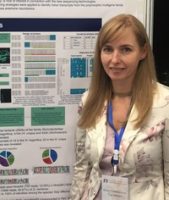MedicalResearch.com Interview with:
Celeste Karch, PhD
Assistant Professor of Psychiatry
Molecular mechanisms underlying tauopathies
Washington University School of Medicine
St Louis
MedicalResearch.com: What is the background for this study? What are the main findings?
Response: Nearly half of all patients with amyotrophic lateral sclerosis (ALS), a fatal neuromuscular disorder, develop cognitive problems that affect memory and thinking. Why a disease that primarily affects movement also disrupts thinking has been unclear.
Our findings suggest that genetic connections between the two disorders may explain why they share some of the same features and suggest that some drugs developed to treat ALS also may work against frontotemporal dementia and vice versa. We used a statistical method in almost 125,000 individuals with ALS, frontotemporal dementia (FTD), progressive supranuclear palsy, corticobasal degeneration, Alzheimer’s disease and Parkinson’s disease to determine whether there are common genetic variants that increase risk for multiple neurodegenerative diseases.
We found that common variants near the
MAPT gene, which makes the tau protein, increases risk for ALS. MAPT has previously had been associated with diseases including frontotemporal dementia and Alzheimer’s disease. But the gene hadn’t been linked to ALS.
We
also identified variations in a second gene,
BNIP1, which normally plays an important role in protecting against cell death, increased the risk of both ALS and frontotemporal dementia. Importantly
BNIP1 mRNA levels were altered in people who had ALS and in patients with frontotemporal dementia, suggesting the
BNIP1 may be a potential therapeutic target for both disorders.
(more…)



















